If you are seeking to apply for a PhD within the field of electrochemistry and more specifically batteries, we have gathered a list below of the research institutions and companies working intensely within this area:
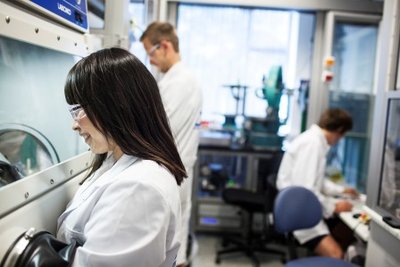 Aarhus University, department of Chemistry
Aarhus University, department of Chemistry
Center for Energy Materials » Research » Battery Materials
In Center for Energy Materials, we are studying a large range of different materials for Li ion batteries. We are studying how novel environmentally benign, low cost synthesis methods can be used in the production of nanomaterials for both the Li-ion battery anode and cathode. The performance of the materials is tested in our battery lab using coin cells. In other words CEM encompasses and supports a very effective in-house evaluation cycle of
1. Synthesis of battery material X
2. Use X for the construction of actual batteries
3. Testing of battery performance, thus assessing the quality of X
4. Modifications to synthesis, new cycle begins
Along the way, detailed structural investigations of the crystal- and nanostructure using both X-ray and neutron scattering, electron microscopy and a range of other characterization techniques are used to link the performance with the structure of the materials. The approach yields a deep and unprecedented understanding of important functional materials.
Contact Person: Steinar Birgisson
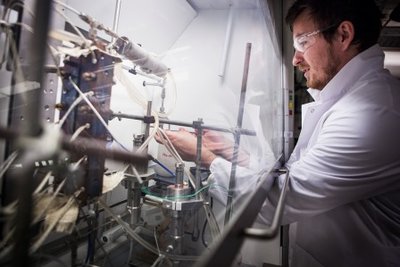
University of Southern Denmark
Department of Chemical Engineering, Biotechnology and Environmental Technology
Inorganic energy materials
Our research evolves around inorganic materials for energy storage and conversion. Our major on-going activities are focusing on materials for rechargeable batteries and spans from material design and synthesis using various inorganic synthesis methods, material characterization with focus on structure and topology as well as battery fabrication and tests of battery performance.
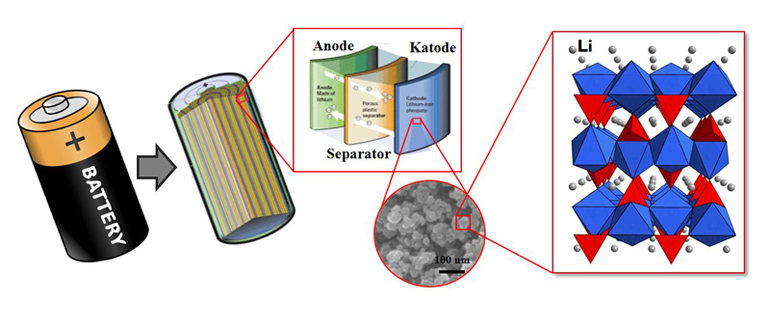
In general we aim to understand correlation between material composition (chemistry), atomic structure (crystallography) and battery performance (electrochemistry). A powerful tool that helps us achieve this is operando powder X-ray diffraction, which allows us to look at the detailed changes in the atomic structure within the battery materials while the batteries are being charged and discharged. Information gained through this tool helps us deduce new material design criteria for development of cheaper, safer and more efficient batteries.
For more information on our research, read about our on-going projects and about how we utilize synchrotron X-rays to look inside running batteries.
Contact Person: Dorthe B. Ravnsbæk
DTU Energy
Department of Energy Conversion and Storage
The research in the Department of Energy Conversion and Storage targets new battery types with improved energy density, power density, durability and stability. We develop, characterize and test novel materials, cells and battery packs, in close collaboration with national and international research institutions and industry.
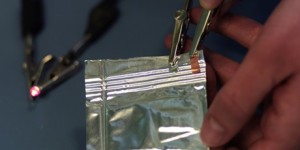 Our main activities are centered on atomic-scale computational materials design, using density functional theory (DFT) simulations on supercomputers, followed by synthesis of the most promising new materials. The materials development is closely coupled to the characterization of the structural, chemical, and electrochemical properties. Characterization down to the nano- and microscale is done using international large-scale neutron and synchrotron facilities. An important aspect is the development of in situ scattering methods to study the microstructure of the materials during realistic operation conditions. Finally, the materials are integrated in battery cells and packs for testing of performance and durability using, e.g., impedance spectroscopy.
Our main activities are centered on atomic-scale computational materials design, using density functional theory (DFT) simulations on supercomputers, followed by synthesis of the most promising new materials. The materials development is closely coupled to the characterization of the structural, chemical, and electrochemical properties. Characterization down to the nano- and microscale is done using international large-scale neutron and synchrotron facilities. An important aspect is the development of in situ scattering methods to study the microstructure of the materials during realistic operation conditions. Finally, the materials are integrated in battery cells and packs for testing of performance and durability using, e.g., impedance spectroscopy.
We are not only working on the development of novel materials for existing battery technologies, e.g. new cathodes and solid electrolytes for lithium-ion (and similar metal-ion) batteries, but also on emerging technologies such as next-generation metal-air and metal-sulphur batteries which have a significantly higher energy density.
Aalborg University
Department of Energy Technology
The Energy Technology programme is a multi-disciplinary doctoral programme aiming at solving future challenges in the energy area by means of developing new energy technologies leading to a more efficient and sustainable management of energy. It covers a broad range of energy-related topics focusing on the energy conversion process itself as well as generation, transmission, distribution and efficient use of energy are covered. Inherently it is involving various areas of both classical and new engineering sciences as well as basic research as the physical quantity “energy” and its provision and use spans broadly over almost all activities a modern society faces. Electrical, thermal, mechanical, hydraulics and control engineering sciences merge in various ratios with physics and chemistry to provide front-end knowledge enabling step by step solutions to help fulfilling the climate and emission goals set by international societies. The programme is highly experimentally oriented and offers state of the art laboratory facilities. Research cooperation with both Danish and international industries is strong as well as with world class academia. The programme has hosted + 100 PhD’s for the last years and is graduating around 25 new energy technology PhD’s every year.
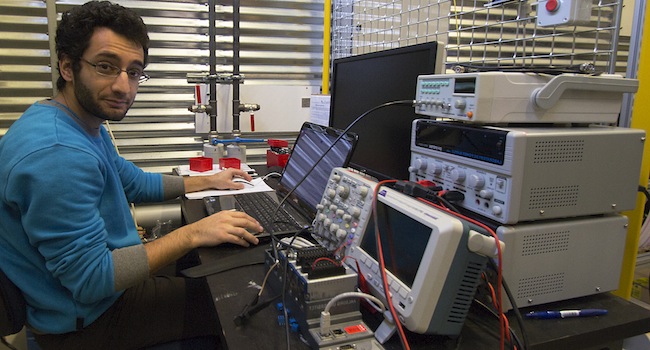
Research areas:
The programme belongs under The Doctoral School of Engineering and Science and focuses on:
- Power Electronics (PE) and its applications with special focus on reliability in PE. Another main focus is the interaction of PE with power systems and generation and load units.
- Electrical Power Systems including production, transmission, distribution of electrical energy as well as power quality, stability, control and protection in AC and DC systems.
- High Voltage Engineering with focus on environmentally friendly overhead lines
- Smart grid and micro grid and their application to modern societies
- Energy Efficiency as a universal term spanning the above science areas
- Renewable energy generation technologies incl. wind turbines and offshore wind power plants, photovoltaic, wave energy, thermoelectric, fuel cells and biofuels.
- Reliability, diagnosis and predictive maintenance of electrical and thermal components and systems
- Energy harvesting systems such as thermo-electric generators and systems
- Automotive and industrial drives including the design of electrical motors and generators and gears in combination with their power electronics and control.
- Systems analysis, design and optimization of a wide range of energy processes, machines and systems
- Heating/cooling systems and their distribution networks (domestic heating)
- Biomass to energy systems, including biomass to liquid fuels and end use applications
- Fluid power systems and their control
- Energy storage and power management
- Analysis and optimization of thermal cycles.
